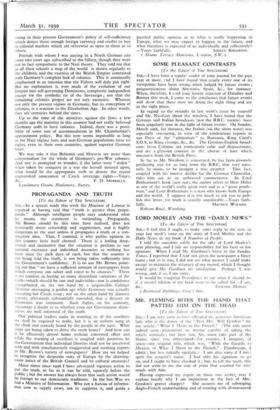PROPAGANDA AND TRUTH
[To the Editor of THE SPECTATOR] SIR,—In a speech made this week the Minister of Labour is reported as having said that " truth is greater than propa- ganda." Although intelligent people may understand what he means the statement is misleading. Propaganda, Mr. Brown should by this time have realised, does not necessarily mean censorship and suppression, and is highly dangerous to the user unless it propagates a truth or a con- structive idea. That, I contend, is why public opinion in this country feels itself cheated. There is a feeling deep- rooted and instinctive that the situation is perilous to our national existence and individual decencies as nothing has been since the dark days of 1918, but that the country is not being told the truth, is not being taken sufficiently into the Government's confidence. It is no use Mr. Brown point- ing out that " we have a sufficient amount of newspapers from which everyone can select and reject as he chooses." There is no comfort in having so many discordant variations of the truth—which should be one and indivisible—nor is confidence strengthened on the one hand by a responsible Cabinet Minister envisaging a golden age while Germany was actually executing her Czech coup ; nor on the other hand by alarmist reports, afterwards substantially amended, that a descent on Roumania was imminent. Such flights, on the contrary, encourage a doubt as to whether even our Government them- selves are well informed of the truth.
Our political leaders unite in warning us of the sacrifices we shall be required to make, but it is an anthem sung in the choir and scarcely heard by the people in the nave. What steps are being taken to drive the truth home? And how can it be effectively driven home without concerted effort and while the warning of sacrifices is coupled with promises by the Government that individual liberties shall not be interfered with and with simultaneously exaggerated and soothing reports in Mr. Brown's variety of newspapers? How are we helped to recognise the desperate state of Europe by the drawing- room antics of the British Council and its cultural amateurs?
Many times since 1936 I have advocated vigorous action to put the truth, so far as it can be told, squarely before the public ; but the answer has always been that such action would be foreign to our democratic traditions. In the last War we had a Ministry of Information. Why not a bureau of informa- tion now to supply news, not to suppress it, and guide a puzzled public opinion as to what is really happening in Europe, what we may expect to happen in the future, and what therefore is expected of us individually and collectively?


































































 Previous page
Previous page